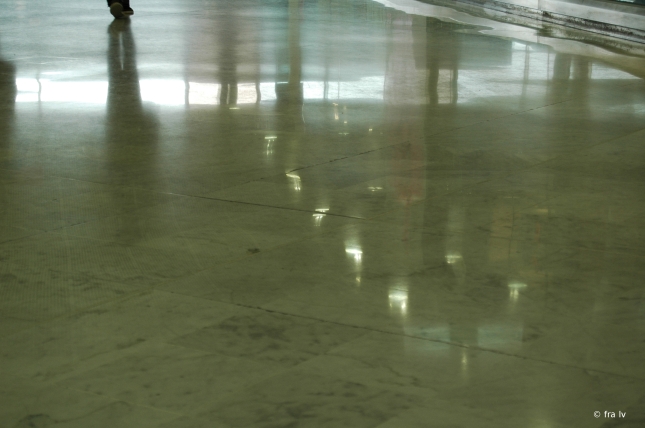Grey heavy sky over the capital, seen only from the perspective of its snake-like highway, as faster (and obligated) way to reach the airport at the other far end of the city. No wish to get lost in the labyrinth of streets of the city center, nor to experience the famous Paris atmosphere through an extremely short glimpse. Straight to my direction, without distractions! “Le Monde” and “The Herald Tribune” will keep me company during the waiting hours on an Orly’s bench.
I failed in my “fight” against individualistic-thinking, in my attempt to gather up to 3 persons to form a small group and get a bus reduction with the Air France shuttle. I didn’t actually tried too hard, but still it was quite interesting to observe social behaviour. I am every time surprised to see how big is the distance among people.
Busy in reading the newspapers and observing people walking around. Spaces are bigger than in Berlin and passengers do quite look the same everywhere.
Short flash back. While still sitting in Tegel airport waiting for the gate to open and start the boarding, I found myself travelling again inside my crowded thoughts , chosing a possible next destination for my roaming plans.
My time-killing activity is either exploring every single corner of the airport or picking up a new sit where to read another article from the newspapers. Soldiers in group of three carrying machine guns walk around the hall of Orly.
I ask myself if it’s a standard procedure in France or a special measure aimed at finding something/someone. Well, in Italy you can see soldiers instead of police in the biggest cities, concentrated in the touristic areas and not in the troubled outskirts. Germany so far seems not so concerned apart from more strikt access rules to governmental premises.
Besides the usual “duty free” shops, cafès, WiFi areas, restaurants and luxury shops the Orly airport offers another service to people wanting to look perfectly neat from the top of their heads till their shoes. In front of a sophisticated French-atmosphere “Salon de the” there is a shoe-blacker addressing all passers-by. Everyone smiles and thanks him kindly, at least all French people do. I’d like to approach him and ask some (interesting) anecdotes about his job, but I keep on watching the scene from a distance as if self-imbarassed by my own thoughts. Men are those who agree in letting their shoes being cleaned and polished. Their average age is over 30. One in particular seems to be extremely interested in his techniques and asks to make several tries even with his leather bag, so as to check the quality of the products used. Younger men on the contrary laugh in silence and move ahead. And here again my questions. Not taking into account business people or those whose outfit should always be flawless, is it a common custom to walk with clean shoes? It’s probably a habit as any other, but simply while living in Berlin I forgot to pay attention to such a detail, although when it comes to other people’s shoes, my leather boots are treated like a piece of my flesh. How comes that such profession – the shoe-blacker – still survives in the so-called developed Western countries? Or maybe I’m seeing the whole picture from the wrong perspective, the one that finger-points and makes distinctions between respectable jobs and those belonging to a long gone past. I saw shoe-blackers in BIH, Serbia, Poland. And I had the same reaction of surprise.
Nowadays there is a lot of talking around the importance of keeping old crafts alive, to protect them from mass production and consumer dynamics, by at the same time innovating them, adding a “younger and fancier” flavour under an optic of sustainability. Open sources, hand-made, re-cycling and accessibility seem to be (at least in Berlin) the guidelines for designers, entrepreneurs and responsible citizens/consumers.
But does shoe-blacker belong to this old crafts heritage? Is the job as such a symbol of richness of a country or of poverty of the person practicing it? And people working in call centers are considered to be at what level of the social ladder? Getting out of topic, right? Maybe not so much.


